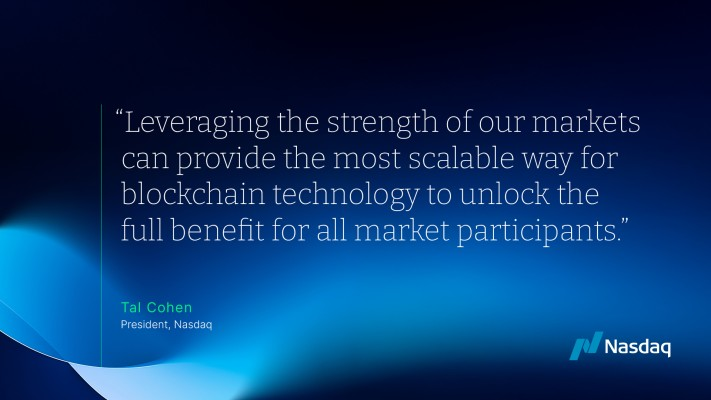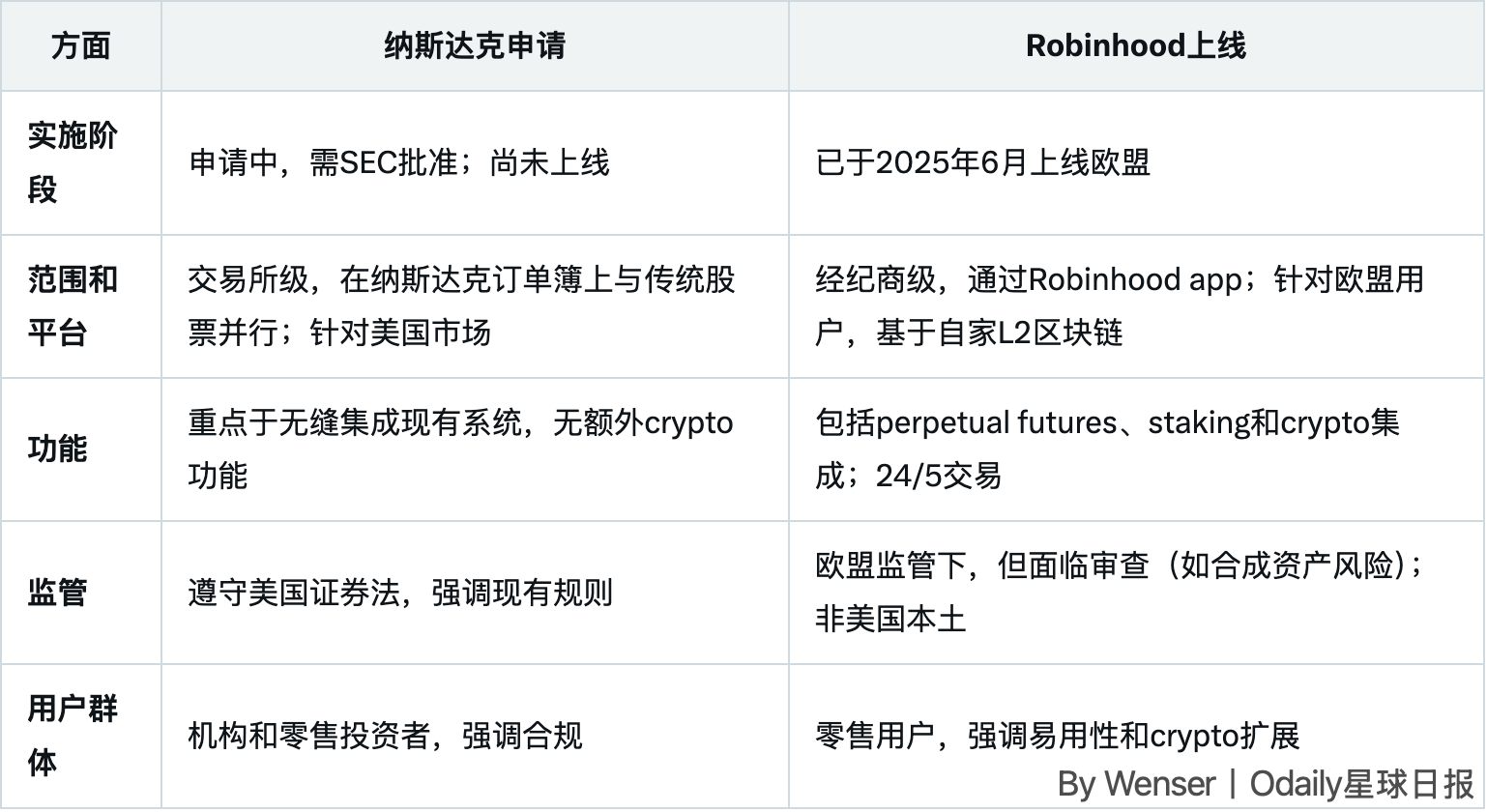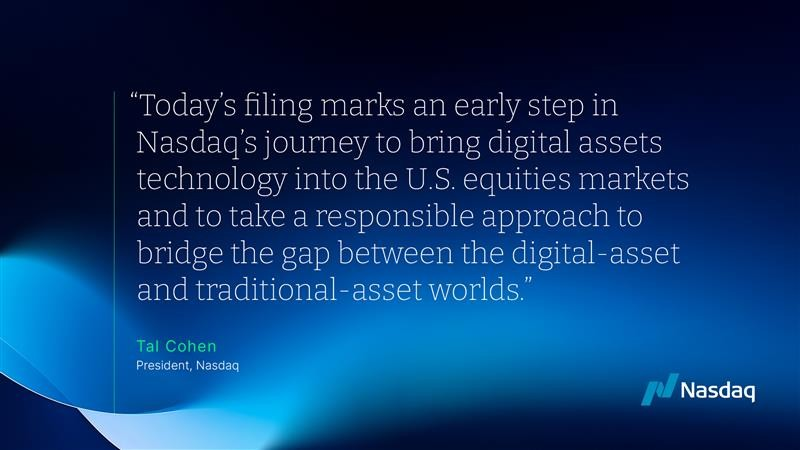Traditional exchanges revolutionize: Nasdaq applies for tokenized stock trading, targeting a trillion-dollar market
- 核心观点:纳斯达克申请代币化证券交易,推动传统金融与区块链融合。
- 关键要素:
- 申请提交SEC,寻求合规代币化股票交易。
- 计划通过DTC进行清算和结算,确保权益。
- 结合TradFi与DeFi优势,保持市场弹性。
- 市场影响:引入传统资金,丰富加密市场交易标的。
- 时效性标注:长期影响。
Original | Odaily Planet Daily ( @OdailyChina )
By Wenser ( @wenser 2010 )

Following Robinhood’s launch of stock tokens in the European market, the US stock exchange Nasdaq has formally submitted an application for stock tokenized trading to the US SEC.
“Combining tokenization and blockchain technology with traditional market infrastructure presents a remarkable opportunity for the global financial system, with the potential to deliver profound benefits to issuers, investors, and the global economy by reducing friction, shortening settlement times, automating processes, and improving the efficiency of capital and collateral management,” Nasdaq President Tal Cohen said in a LinkedIn post.
If this application is approved, on-chain tokenized stock trading will also enjoy dividend distribution, proxy voting, and clear legal oversight rights. Odaily Planet Daily will provide a brief analysis of this milestone in this article for your reference.
TradFi Exchange actively seeks change, and Nasdaq sets off a wave of tokenized securities trading
It is worth mentioning that the news of "Nasdaq submitting an application for tokenized securities trading to the US SEC" was not revealed in any official documents, but came from a post published by Nasdaq President Tal Cohen on LinkedIn. On the one hand, this move may be related to the confidentiality requirements of the application documents; but on the other hand, it may also reflect Nasdaq's slightly cautious official attitude on this matter to a certain extent.
After all, in addition to regulatory compliance, Nasdaq still needs to confirm specific technical implementation plans, trading time rules, and specific fund delivery plans when listing tokenized stocks.
But in any case, this move by Nasdaq, one of the largest stock exchanges in the world today, is undoubtedly an "industry milestone" event.
Nasdaq's ambition: taking stock tokenization to the next level
According to public data, Nasdaq's total trading volume is estimated to be approximately 49.2 billion shares in 2024, and approximately 26.2 billion shares in the first half of 2025. Media reports indicate that individual investor trading volume on Nasdaq reached $6.6 trillion in the first half of 2025. Furthermore, according to data released by Dealogic, Nasdaq IPOs (including IPOs of blank-check acquisition companies) raised approximately $21.3 billion in the first half of 2025, compared to just $8.7 billion on the New York Stock Exchange. This makes the former the undisputed leader in the US stock market.
Such a huge trading volume and transcendent market position naturally call for more innovative trading participation methods and diversified investment targets. This may be one of the reasons why Nasdaq has high hopes for stock tokenization.

Nasdaq's statement: catering to the US SEC's "Project Crypto" action
In addition to its own development needs, Nasdaq's application for stock tokenization trading may also be considered as a "proactive statement."
Previously, SEC Chairman Paul Atkins explicitly stated that asset tokenization is a major priority for the SEC, and the regulator formed a working group to advance this issue during a series of cryptocurrency roundtables earlier this year. A key component of the SEC's Project Crypto initiative is to clear the way for a world-leading tokenized securities market.
On May 12 of this year, Paul Atkins said: “This shift in securities from off-chain systems to on-chain systems is similar to the transition of recordings from analog vinyl records to cassette tapes to digital software decades ago. The migration to on-chain securities has the potential to reshape all aspects of the securities market by enabling entirely new methods of issuing, trading, owning, and using securities.”
When it comes to understanding the direction of the wind, never underestimate the sensitivity and ability to respond quickly of an organization and the veterans who have been deeply involved in traditional finance for decades.
Nasdaq offers a different approach to stock tokenization than Robinhood.
Regarding the specific stock tokenization plan proposed by Nasdaq, we can understand it from the following three aspects:
First, tokenized stocks are treated the same as traditional stock trades in terms of trade priority. The fact that an order contains tokenized securities or indicates a preference for clearing and settling securities in token form does not affect the exchange's priority for executing that order. Under this new system, already digitized stock trades will be recorded via a digital ledger, which "provides the novel capability of recording evidence of security ownership and transactions."
Secondly, in terms of specific implementation, if Nasdaq lists tokenized stocks, it will clear and settle token transactions through The Depository Trust Co. (DTC), founded in 1973 and responsible for clearing trillions of dollars in transactions annually. Furthermore, Nasdaq plans to offer exchange-traded products, such as ETFs, which will begin operating "after DTC establishes the necessary infrastructure and transaction settlement services."
Third, in terms of product investor rights, investors who purchase tokenized stock products will obtain all the rights of the relevant stocks, including voting rights and liquidation rights; and regulated custodian institutions will ensure that shareholders can receive dividends.
In addition to the above-mentioned advantages of combining the dual fields of TradFi and DeFi, Nasdaq President Tal Cohen also emphasized: "(Stock tokenization) should not come at the expense of the resilience, security and good governance that currently exist in the U.S. stock market. Therefore, we are ready to work with existing and new providers of critical trade infrastructure services to innovate while maintaining the basic trust principles that support the market." In other words, the tokenized stock products that Nasdaq plans to launch will still strictly comply with U.S. securities laws and compliance requirements.
Nasdaq vs. Robinhood: Different Progress, Levels, Markets, and User Bases
Specifically, compared with Robinhood's previously launched stock tokenization product, Nasdaq's solution is undoubtedly more "simplistic." Of course, it can also be said to be "old wine in a new bottle" or "the medicine in a new bottle." The following is a brief comparison of the two products:

In short, Nasdaq is simply adding a tokenized wrapper to traditional stocks. Leveraging this new system, Nasdaq has implemented a non-crypto-native tokenization solution. In the short term, this move will introduce a certain amount of traditional financial investment users and liquidity to the crypto market. In the long term, stock tokenization will provide the crypto market with a diverse range of trading assets and open the door to US stock investment for investors from around the world.

Perhaps in the near future, the implementation of RWA will not only include the digitization and monetization of crypto assets from the real world, but also the assetization and materialization of crypto assets from the real world.



